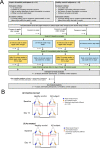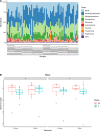Apple cider vinegar soaks do not alter the skin bacterial microbiome in atopic dermatitis
- PMID: 34077434
- PMCID: PMC8172074
- DOI: 10.1371/journal.pone.0252272
Apple cider vinegar soaks do not alter the skin bacterial microbiome in atopic dermatitis
Abstract
Introduction: Atopic dermatitis is a common skin disease characterized by altered cutaneous immunity in which patients often exhibit lower skin microbiota diversity compared to healthy skin and are prone to colonization by Staphylococcus aureus. Apple cider vinegar has been shown to have antibacterial effects; however, its effects on the skin microbiome have not previously been well-described.
Objectives: We aimed to examine the effects of topical dilute apple cider vinegar soaks on Staphylococcus aureus abundance, skin bacterial microbiome composition, and skin bacterial microbiome diversity in atopic dermatitis participants compared to healthy skin.
Methods: Eleven subjects with atopic dermatitis and 11 healthy controls were enrolled in this randomized, non-blinded, single-institution, split-arm pilot study. Subjects soaked one forearm in dilute apple cider vinegar (0.5% acetic acid) and the other forearm in tap water for 10 minutes daily. Skin bacteria samples were collected from subjects' volar forearms before and after 14 days of treatment. 16S sequencing was used to analyze Staphylococcus aureus abundance and skin bacterial microbiome composition, and alpha diversity of microbiota were determined using Shannon diversity index.
Results: There was no difference in skin bacterial microbiome in atopic dermatitis subjects after 2 weeks of daily water or apple cider vinegar treatments (p = 0.056 and p = 0.22, respectively), or in mean abundance of S. aureus on apple cider vinegar-treated forearms (p = 0.60). At 2 weeks, the skin bacterial microbiomes of healthy control subjects were not significantly different from the skin bacterial microbiome of atopic dermatitis subjects (p = 0.14, 0.21, 0.12, and 0.05).
Conclusions: Our results suggest that daily soaks in 0.5% apple cider vinegar are not an effective method of altering the skin bacterial microbiome in atopic dermatitis. Further studies are needed to explore the effects of different concentrations of apple cider vinegar on skin microflora and disease severity.
Trial number: UVA IRB-HSR #19906.
Conflict of interest statement
The authors have declared that no competing interests exist.
Figures


Similar articles
-
Apple cider vinegar soaks [0.5%] as a treatment for atopic dermatitis do not improve skin barrier integrity.Pediatr Dermatol. 2019 Sep;36(5):634-639. doi: 10.1111/pde.13888. Epub 2019 Jul 22. Pediatr Dermatol. 2019. PMID: 31328306 Clinical Trial.
-
Cutaneous microbiome effects of fluticasone propionate cream and adjunctive bleach baths in childhood atopic dermatitis.J Am Acad Dermatol. 2016 Sep;75(3):481-493.e8. doi: 10.1016/j.jaad.2016.04.066. J Am Acad Dermatol. 2016. PMID: 27543211 Free PMC article. Clinical Trial.
-
Targeted anti-staphylococcal therapy with endolysins in atopic dermatitis and the effect on steroid use, disease severity and the microbiome: study protocol for a randomized controlled trial (MAAS trial).Trials. 2017 Aug 31;18(1):404. doi: 10.1186/s13063-017-2118-x. Trials. 2017. PMID: 28859690 Free PMC article.
-
Skin Microbiome in Atopic Dermatitis.Acta Derm Venereol. 2020 Jun 9;100(12):adv00164. doi: 10.2340/00015555-3514. Acta Derm Venereol. 2020. PMID: 32419029 Free PMC article. Review.
-
The Skin Microbiome in Atopic Dermatitis and Its Relationship to Emollients.J Cutan Med Surg. 2016 Jan;20(1):21-8. doi: 10.1177/1203475415605498. Epub 2015 Oct 22. J Cutan Med Surg. 2016. PMID: 26492918 Review.
Cited by
-
Lactic Acid Bacteria in Vinegar Fermentation: Diversity, Functionality and Health Benefits.Foods. 2025 Feb 18;14(4):698. doi: 10.3390/foods14040698. Foods. 2025. PMID: 40002142 Free PMC article. Review.
-
Pro-Health Potential of Fruit Vinegars and Oxymels in Various Experimental Models.Int J Mol Sci. 2024 Dec 24;26(1):7. doi: 10.3390/ijms26010007. Int J Mol Sci. 2024. PMID: 39795866 Free PMC article. Review.
-
Limosilactobacillus reuteri in immunomodulation: molecular mechanisms and potential applications.Front Immunol. 2023 Aug 9;14:1228754. doi: 10.3389/fimmu.2023.1228754. eCollection 2023. Front Immunol. 2023. PMID: 37638038 Free PMC article. Review.
-
Skin microbiota: pathogenic roles and implications in atopic dermatitis.Front Cell Infect Microbiol. 2025 Jan 14;14:1518811. doi: 10.3389/fcimb.2024.1518811. eCollection 2024. Front Cell Infect Microbiol. 2025. PMID: 39877655 Free PMC article. Review.
-
Bathing in Atopic Dermatitis in Pediatric Age: Why, How and When.Pediatr Rep. 2024 Jan 8;16(1):57-68. doi: 10.3390/pediatric16010006. Pediatr Rep. 2024. PMID: 38251315 Free PMC article. Review.
References
-
- Kennedy EA, Connolly J, Hourihane JO, Fallon PG, McLean WHI, Murray D, et al.. Skin microbiome before development of atopic dermatitis: Early colonization with commensal staphylococci at 2 months is associated with a lower risk of atopic dermatitis at 1 year. J Allergy Clin Immunol. 2017;139(1):166–72. 10.1016/j.jaci.2016.07.029 - DOI - PMC - PubMed
Publication types
MeSH terms
Substances
LinkOut - more resources
Full Text Sources
Medical
Miscellaneous

